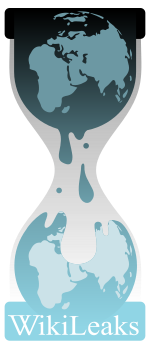Wikileaks
 | |
| URL | www.wikileaks.org |
|---|---|
| Type of site | Whistleblower |
| Registration | Private |
| Launched | December 2006 |
Wikileaks is an amorphous, international organization, based in Sweden,[1] that publishes anonymous submissions and leaks of sensitive documents from governments and other organizations, while preserving the anonymity of their sources. Its website, launched in 2006, is run by The Sunshine Press.[2] The organization has stated it was founded by Chinese dissidents, as well as journalists, mathematicians, and start-up company technologists from theU.S., Taiwan, Europe, Australia, and South Africa.[3] Newspaper articles and The New Yorkermagazine (June 7, 2010) describe Julian Assange, an Australian journalist and Internet activist, as its director.[4] Within a year of its launch, the site said its database had grown to more than 1.2 million documents;[5] while the "Collateral Murder" video is one of its most notable releases.[6][7] It has won a number of new media awards for its reports.
Wikileaks went public in January 2007, when it first appeared on the Web.[8] The site states that it was "founded by Chinese dissidents, journalists, mathematicians and start-up company technologists, from the US, Taiwan, Europe, Australia and South Africa".[3] The creators of Wikileaks were unidentified as of January 2007,[9] although it has been represented in public since January 2007 by non-anonymous speakers such as Julian Assange, who had described himself as a member of Wikileaks' advisory board[10] and was later referred to as the "founder of Wikileaks".[11] As of June 2009, the site had over 1,200 registered volunteers[3] and listed its advisory board as consisting of Assange, Phillip Adams, Wang Dan, CJ Hinke, Ben Laurie, Tashi Namgyal Khamsitsang, Xiao Qiang, Chico Whitaker, and Wang Youcai.[12] Despite appearing on the list, when contacted by Mother Jones magazine in 2010, Khamsitsangs said he received an e-mail from Wikileaks, but never agreed to be an advisor.[13]
Wikileaks states that its "primary interest is in exposing oppressive regimes in Asia, the former Soviet bloc, Sub-Saharan Africa and the Middle East, but we also expect to be of assistance to people of all regions who wish to reveal unethical behavior in their governments and corporations."[3][14]
In January 2007, the website stated that it had over 1.2 million leaked documents that it was preparing to publish.[15] An article in The New Yorker said that "one of the WikiLeaks activists owned a server that was being used as a node for the Tor network. Millions of secret transmissions passed through it. The activist noticed that hackers from China were using the network to gather foreign governments’ information, and began to record this traffic. Only a small fraction has ever been posted on WikiLeaks, but the initial tranche served as the site’s foundation, and Assange was able to say, “We have received over one million documents from thirteen countries.”"[16] Assange responded to such statements by saying "the imputation is incorrect. The facts concern a 2006 investigation into Chinese espionage one of our contacts were involved in. Somewhere between none and handful of those documents were ever released on WikiLeaks. Non-government targets of the Chinese espionage, such as Tibetan associations were informed (by us)".[17] The group has subsequently released a number of other significant documents which have become front-page news items, ranging from documentation of equipment expenditures and holdings in the Afghanistan war to corruption in Kenya.[18]
Their stated goal is to ensure that whistle-blowers and journalists are not jailed for emailing sensitive or classified documents, as happened to Chinese journalist Shi Tao, who was sentenced to 10 years in 2005 after publicising an email from Chinese officials about the anniversary of the Tiananmen Square massacre.[19]
The project has drawn comparisons to Daniel Ellsberg's leaking of the Pentagon Papers in 1971.[20] In the United States, the leaking of some documents may be legally protected. The U.S. Supreme Court has ruled that the Constitution guarantees anonymity, at least in the area ofpolitical discourse.[20] Author and journalist Whitley Strieber has spoken about the benefits of the Wikileaks project, noting that "Leaking a government document can mean jail, but jail sentences for this can be fairly short. However, there are many places where it means long incarceration or even death, such as China and parts of Africa and the Middle East."[21]
The site has won a number of awards, including the 2008 Economist magazine New Media Award,[22] and in June 2009, Wikileaks and Julian Assange won Amnesty International UK's Media Award 2009 (in the category "New Media") for the 2008 publication of "Kenya: The Cry of Blood - Extra Judicial Killings and Disappearances",[23] a report by the Kenyan National Commission on Human Rights about police killings in Kenya.[24] In May 2010 it was rated number 1 of "websites that could totally change the news".[6]
Tidak ada komentar:
Posting Komentar